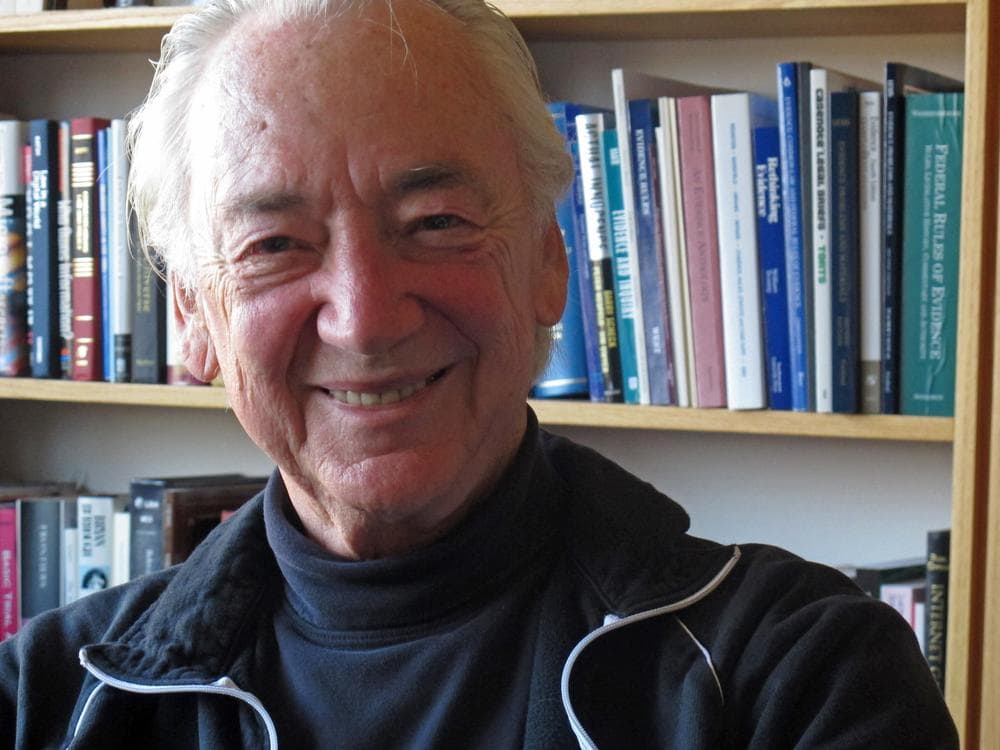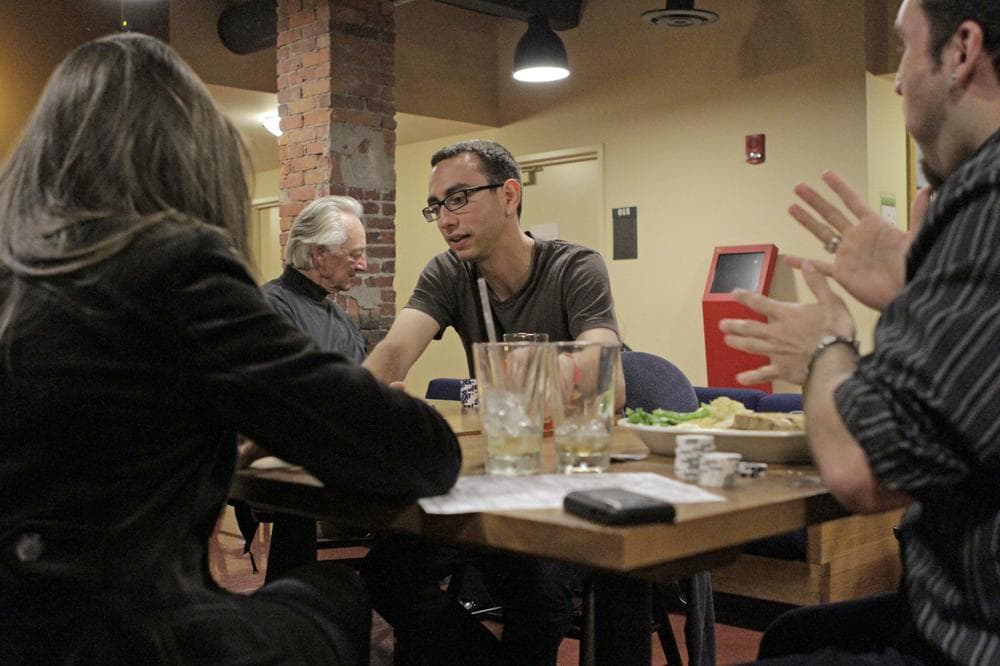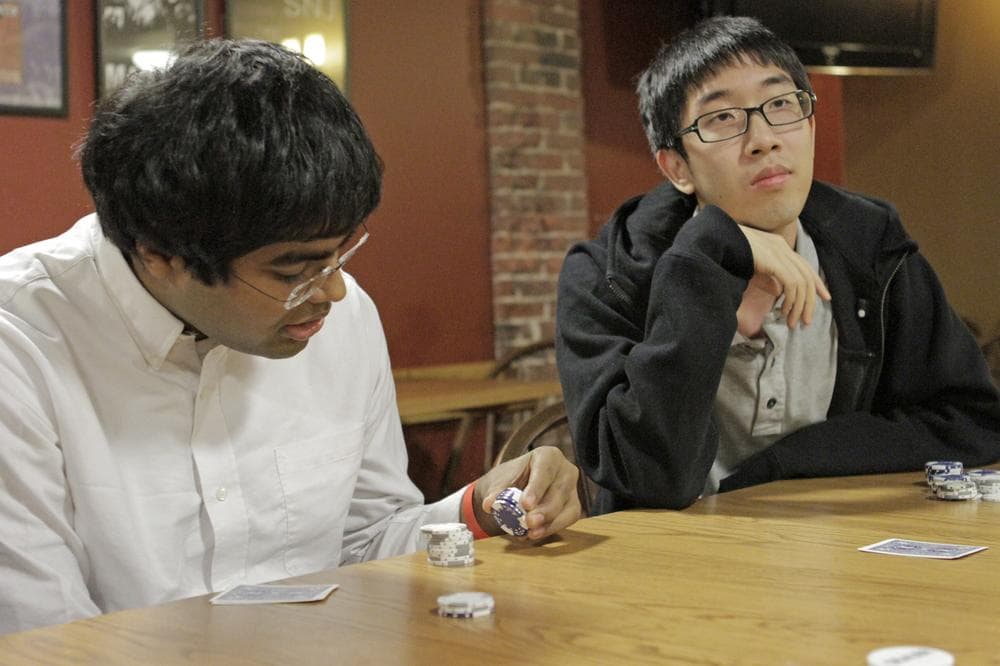Advertisement
Harvard Law's Poker Strategic Thinking Society
Resumehttp://www.youtube.com/watch?v=bAxvtz_g_NA
Early Wednesday morning, Pius Heinz beat out Martin Staszko to win the 2011 World Series of Poker. The event was broadcast nearly live on ESPN2, and the scene looked nothing like the poker scenes in old spaghetti Westerns.
As both players pushed all-in on the final hand, Heinz, a 22 year old German in a pristine white hoodie sipped from a bottle of what looked like tomato juice, while the 35 year old Czech, Stashko, sweated it out with water.
When the cards were revealed and Heinz was declared the winner, he ran into the arms of his parents, while his gallery serenaded him.
"If anything it looks like an incredibly boring place," said Harvard Law Professor Charles Nesson. "No drinks. No smoke. No bad language. No nothing."
Professor Nesson has been on the faculty at Harvard Law School since 1966. He teaches evidence and internet, and as strange as it might sound, he is an advocate for the sport of poker.

"I believe it's time for it to shake loose from the awful reputation it built up through its genesis as a gambling game," Professor Nesson explained. "It has had an equally distinguished history as an academic pursuit.
Professor Nesson says strategic thinking, taking risks based on limited information, empathizing with an opponent, and even showing strength from a position of weakness are all skills vital for playing poker and practicing law.
Through his poker reading group for first year law students and the Harvard Poker Thinking Society, which he advises, he's brought the game of poker, and its higher level reasoning skills, to countless Harvard Law Students.
But he's not done. He'd like to see parents play poker with their kids, and even suggests the game could be taught in elementary school classrooms.
"Absolutely." Nesson insisted. "I mean it'll get me in trouble for it because people say, 'Oh my god, the kids being taught gambling!' But, yes, absolutely."
Nesson says kids need to be taught how to take risks within their means, how to manage their stake in life, and how to keep from going bust. And the game doesn't need to be played for money to teach those lessons.
Professor Nesson is working with the newly formed US Poker Federation to separate the game of poker from its gambling past. The organization would like to see tournaments set up like any other sport, where participants are competing for sponsors' money and not their own. And, they'd like to get the game added to the official roster of "mind sports" by the International Mind Sport Federation. It's a distinction currently reserved for Chess, the Asian game of Go, Draughts, which is a 10 x 10 form of checkers, and Duplicate Bridge.
First, Professor Nesson says, poker must be established as a game that can be played completely without the element of chance.
To that end, Professor Nesson and his students at Harvard Law have tested Duplicate Poker, a form of the game that's played with teams of six players at six different tables with identically shuffled cards to diminish the role of luck. The game gets its first big showcase next week on the London Eye, Europe's largest Ferris wheel.

Wednesday night at Harvard University's Queens Head pub, first year law student Brian Koch had no doubt that poker is a game of skill. He's played in the World Series of Poker, and was a full-time professional poker player for two years before coming to law school. He says poker teaches replicable logical thinking that's good for law..and life.
"Sometimes you're gonna have bad outcomes," Koch explained. "If you keep taking the 51% chance over the 49% chance over a large enough sample over a long enough time, that's going to come out in your favor and you're going to end up better off."
Not all of Harvard law's poker players are experienced at the game. Graduate law student Barbara Sobalska pulled out her illustrated poker cheat seat, which made Hector Ramos, the second year to her right, think he could take her.
"Well, yes, actually," Ramos laughed. "And the great thing is, since she's sitting next to me, I can look at it also.
Ramos had only played poker once before, but he had no doubt that the game was more than just a break from his studies, it was an important part of his education.
"All of us have a little fighter in us," Ramos said. "But we have to know when it is time to fight and when it is time to back away. Whether you're a lawyer litigating or a businessman trying to find a deal, these skills apply to everything you do in life."
While the poker skills at Wednesday's event might not have been top notch, the intellectual debate, led in the Socratic style by Professor Nesson, was.
Professon Nesson asked Brian Koch for his progression of thought as the cards were dealt. Koch challenged Nesson to consider what happened in previous hand, and how those outcomes would influence future hands.
Koch talked about the texture of the table. He used phrases like hand range, pot control, and straight value. It was clear that for Koch, poker is an academic pursuit.
"Poker players have aggregated all the theory and reasoning," Koch said. "So we're all playing on a different level. The bad players now are better than the good players were 10 years ago. And it's not even close."

Still, while a batter in his second ever at bat isn't going to have a chance against a pro pitcher, on this night former pro Brian Koch was facing a strong challenge from a guy who had only played poker once before.
After the others had been eliminated, Hector Ramos and Brian Koch traded the chip lead a few times while other members of the Harvard Poker Thinking Society started to complain that they needed to get back to studying. Ramos got impatient and tried to go all-in on a couple of questionable hands, but Koch stayed steady and waited for the right cards.
In the end, Koch drew a full house, and the game was over.
Koch beamed at what he called an unlikely victory. With the precision of a pro, he calculated that his odds of winning had started at just 30 percent.
Koch doesn't just think in terms of what the game of poker can do for law students. He's also thinking about what law students can do for the game of poker.
"The timing for poker players to be in law school couldn't be more perfect," Koch said. "Given that online poker was recently made illegal, there's a lot of legal work to be done in the United States at this moment."
If law students take up that charge, they'll have an ally in Professor Charles Nesson. He says he's looking forward to the day when he can once again sit in bed, playing online poker on his laptop, while his wife, Fern, sits next to him, enjoying her crossword puzzle.
This segment aired on November 12, 2011.
